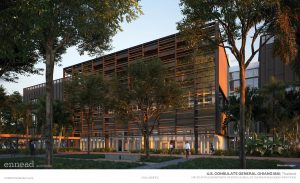On Wednesday, the United States consul general in the northern city of Chiang Mai was forced once again to deny rumors that a new U.S. consulate will house a missile base aimed at China.
Since it broke ground in September 2020, the $284 million consulate complex in Chiang Mai has been the subject of persistent media speculation and social media rumors suggesting that it will house an underground missile depot, or that it will otherwise act as a base for covert shenanigans aimed at Myanmar and China.
“It’s untrue,” Consul General Sean O’Neill told reporters, according to The Nation. “I hereby affirm that the consulate will not be a place for keeping weapons or armaments of the U.S. Army as rumored.”
This is not the first time that U.S. officials in Thailand have been forced to deny rumors about the new consulate. Michael Heath, the chargé d’affaires at the U.S. Embassy in Bangkok, told journalists earlier this month that the real reason for the new building was to serve the 17,000 or so U.S. citizens that live in northern Thailand.
“America has had a consulate in Chiang Mai for 72 years and we are proud to be the oldest foreign consulate in northern Thailand,” Heath said. “For 72 years, the consulate has been on the site of a beautiful old house that was never designed to be an office so we are excited about finally moving into a new modern office building.”
The construction of the new complex, which the consulate has described as “a concrete symbol of America’s continued commitment to northern Thailand for generations to come,” is part of a broader reinforcement of Washington’s diplomatic infrastructure in mainland Southeast Asia, amid the intensifying strategic competition with China, whose influence and investment presence has increased considerably in the region over the past two decades. This also includes a $625 million embassy annex in Bangkok, due for completion in 2025, and a new $1.2 billion embassy in Hanoi.
Given this broader strategic situation, it is hard to believe that the construction of such an imposing diplomatic complex just 500 kilometers from the Chinese border is solely about providing consular services. Writing in Nikkei Asia in January, Michael Vatikiotis situated its construction in the context of the newfound strategic salience of mainland Southeast Asia, arguing that it was “an attempt to reinforce existing U.S. intelligence gathering capacity in northern Thailand.”
That said, the rumors are often exaggerated. According to one other rumor, the U.S. government sent David Eubank, a former U.S. Special Forces officer and founder of the Free Burma Rangers, to provide combat training to Karen villagers battling the Myanmar military. (The Free Burma Rangers solely provide humanitarian support to those in need.) Indeed, disinformation and rumors concerning U.S. activities in Thailand have become so commonplace that the U.S. Embassy in Bangkok has been forced to issue official refutations.
As so often in the case of rumor and disinformation, it remains unclear the extent to which they are the symptom or the cause of the public’s views. In the case of Thailand, suggestions of covert U.S. meddling may be landing in particularly fertile soil. During the height of the Cold War, especially from the 1950s to the early 1970s, the U.S. Central Intelligence Agency (CIA) was very much active in the northern hills, in the context of the communist insurgencies in Myanmar, Thailand, and Laos.
In their 2021 book “The U.S.-Thai Alliance and Asian International Relations: History, Memory, and Current Developments,” Gregory Raymond and John Blaxland of the Australian National University argue that many elite Thais retain keen memories of these U.S. activities, even though the U.S. and Thai governments’ interests were largely aligned at the time. As they write, “American covert interference has remained a trope in Thai history writing.”
As the shared threat of communism has faded since the end of the Cold War, the memories of U.S. interventions have persisted, weighing down the alliance. For Raymond and Blaxland, this selective collective memory helps explain why Thailand, which dwells in such close proximity to the growing power of China, has grown more and more distant from its American treaty ally. This seems to suggest that U.S. denials will do little to prevent such rumors from continuing to swirl.

































